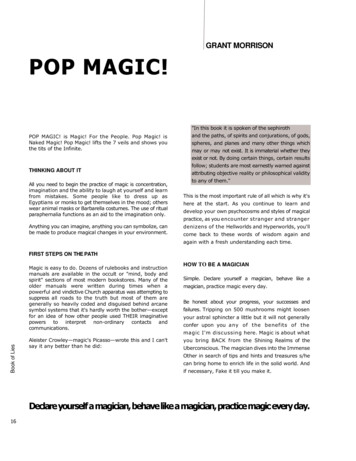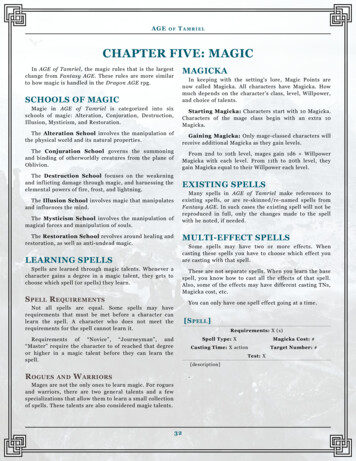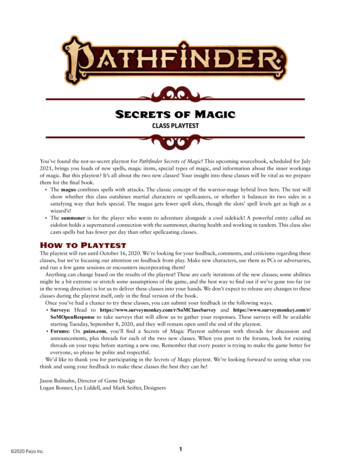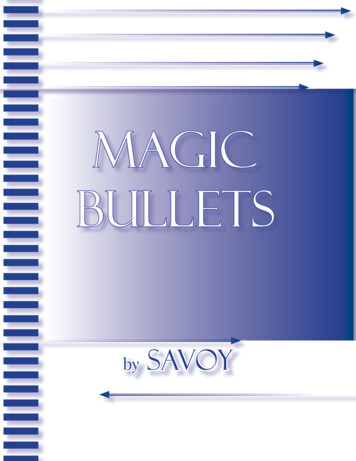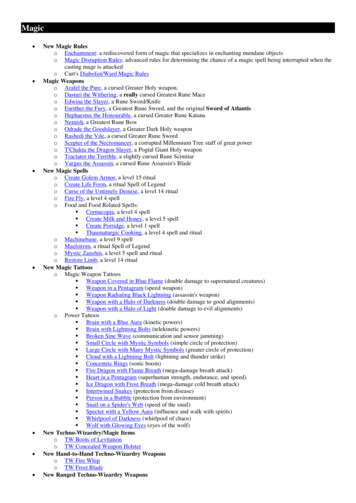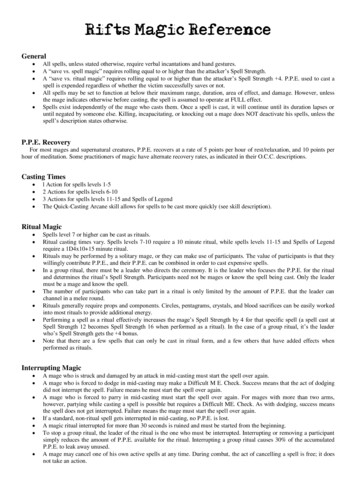
Transcription
Magic WorldQuick-Start Rules
Interior IllustrationsRichard LeDuc and FriendsCover PaintingAndy P. TimmEditing & ProductionNicholas NacarioCopy ReadingMeghan McleanThe Fishsinger’s DaughterRichard LeDucFind more Chaosium Inc. products atwww.chaosium.comMagic World Quick-Start Rules is copyright 2013, 2014 by Chaosium Inc. All rights reserved.The names of public personalities may be referred to, but any resemblance of a scenario character to persons living ordead is strictly coincidental.Except in this publication and associated advertising, all illustrations for Magic World remain the property of the artists,who otherwise reserve all rights.This book is an introduction to the roleplaying game Magic World, available separately.Find more Chaosium titles at www.chaosium.comItem #MWQSISBN10: 1568824327ISBN13: 9781568824321Created in California, Printed in the USA
CONTENTSHow to Play.5The Fishsinger’s Daughter.13Handouts.24Characters.27
Magic World Quick-Start5IF YOU’VE NEVER PLAYED A ROLEPLAYINGGAME BEFORE, READ THIS FIRST!Don’t panic! Despite all the rules, charts,and arcane language, you already knowhow to play this game. It’s simply the same‘let’s pretend’ games you played as a child.But in Magic World, and other roleplayinggames, there are rules to describe how theworld works, and how your characters interact with it. And to solve the perpetual “Igot you!” “No, I got you first!” problems.Magic World has only a few core principlesto keep in mind, and once you know these,you should be fine: Attributes are usually 3-18 (the higher thebetter), human average is 10-11. Make anattribute roll when there is no oppositionand a resistance roll when there is an opposed force that can be rated. The Resistance Table is based on equalforces having a 50/50 chance against oneanother. The more unequal the forces are,the greater the difference. Both scores’chances always add up to 100%. Skills have percentile ratings (the higherthe better), and you want to roll low to succeed. A roll of 99 and/or 00 is a fumble. Aroll over your skill is a failure. A roll equalto or under your skill rating is a success. Aroll of 1/5 your skill is a special success. Aroll of 1/20 your skill is a critical success. Occasionally, skill ratings will be modified by a value (usually within the range of 20%) if some contributing factor makesthings more difficult, or if something makesthe skill attempt easier. When you run out of Hit Points, you die. Most spells use Magic Points for fuel.When these run out, you fall unconscious.Everything else can be determined duringthe course of play, or explained as required.If knowledge of the rules is getting in theway of actually playing, better to play.Remember, this is a game! Have fun with it.How to Play
Magic World Quick-Start6How to PlayStorytelling is the most ancient art in which humanity still engages. From time inmemorial wehave gathered in groups to engage in the mythsand legends of our people. From the hearth firesof ancient tribes, to the glittering cineplexes downthe street, stories help us to understand who wewere, who we are, and who we wish to be.Magic World is a set of rules to allow youand your friends to tell astounding stories offantasy and myth. The rules codify what actions are available within the game, while remaining intuitive so that they do not get inthe way of your enjoyment of the stories.The rules to Magic World are easily remembered. Most tasks can be resolved with a singleroll of the dice. Character creation is quickand intuitive, with numerous options as tocharacter race, skills, etc.But don’t take our word for it. Grab somedice and friends and forge the stuff of legends!RoleplayingFantasy Roleplaying is a form of social gaming, akin to acting out a novel. There are twosorts of players. Most players act out the primary roles in a game, the heroes around whom thetales revolve. They might be swaggering warriors in plate armor, sly beggars whose weaponsare the deformities with which they earn theirliving, or decadent Sorcerers of noble birth.One other player becomes the Chronicler, whodevises and presents the adventures in whichthe rest of the players participate. The Chronicler describes the world in which the Adventurers roam, and how that world is affected by theHow to Playplayers’ actions. While a player acts out only onerole, or perhaps two if playing two Adventurers,the Chronicler presents the entire fantasy worldin which the game is set, with its people, places,monsters, and gods.Play is mostly conversation: the Chronicleroutlines some situation or encounter, thenthe players say what they, in the guise of theAdventurers, propose to do. Relying on therules to keep everything consistent and fair,the Chronicler then tells them how to do whatthey proposed or, if impossible, what happens instead. Dice rolls, the results of whichare unpredictable, keep everyone honest andprovide surprises, triumphs, dismal defeats,and hairs-breadth escapes.Success in roleplaying comes not from players eliminating each other, as in chess or Risk,but in memorably adopting the personas ofcharacters quite different from themselves, andin reacting as those people would to otherworldly scenes and creatures.Part of the pleasure in roleplaying is the interaction and cooperation between players: anovel gives solitary pleasure, but roleplayinggives the satisfaction of theater. Cooperationamong players is important in successfullycompleting the task or quest the scenario setforth, and in granting their own pleasure inthe game—you are not only the actors, butthe audience as well.Many of the game’s details are glossed over herebut since Magic World is a game of fantasy andwonder, this will not the atmosphere of imagination necessary for a good fantasy game.
Magic World Quick-Start7Pre-Generated CharactersThis adventure pack includes several pre-generatedcharacters to use for the adventure at the back of thisQuickStart PDF. It is suggested to use these characters for this adventure to allow new Magic World orBasic Roleplaying players to begin their game rightaway. If your group would like to create their owncharacters, feel free to do so.Once you’ve played a game or two, you willprobably want to take a look at the full rulesfor Magic World, which are available from anygood game store, most large bookstores, or directly from us at www.chaosium.com. To create your character, you will only need threeordinary six-sided dice. To play the game, youshould invest in a full set of polyhedral dice.At least one of 4, 6, 8, 10 and 20-sided diceare needed to play the game.Adventurers by the NumbersTo play Magic World you need a character.Characters in the game are called “Adventurers”because they primarily spend their play timeexploring and adventuring in the regions anddungeons of Magic World. It will be helpful foryou to have a piece of scratch paper handy, orideally a Magic World character sheet. There isone located at the end of this PDF or you candownload one for free at www.chaosium.com.Click on “Free Downloads” then “CharacterSheets, Keeper Forms, and more.”The Primary AttributesTo begin, a Magic World character has sevenprimary attributes:Strength (STR) Strength measures an Adventurer’s muscle power. It shows how much someone can lift, push or pull, or how tightly he canhold on. Strength decides if an Adventurer canwield the heaviest hand weapons at full ability.It is also a component in figuring the damagebonus which may increase the effect of handto-hand attacks.Human STR cannot naturally exceed 21. AnAdventurer reduced to zero Strength is an invalid, unable to leave bed.STRx5 is the Effort roll. Additionally, STRinfluences Damage Bonus and Physical skills.Constitution (CON) Constitution summarizesthe health, vigor, and vitality of an Adventurer.Constitution helps calculate how well an Adventurer resists drowning and suffocation, poisons, diseases, and magic—which makes himharder to kill.If Constitution points are ever reduced tozero, the Adventurer dies.The Stamina roll is equal to CONx5. CONinfluences Hit Points and Perception skills.Dexterity (DEX) Higher Dexterity makes for aquicker and more nimble Adventurer who haspotential for more activity in a round. A successful DEX roll may prevent a fall, let an Adventurer stand in a high wind, do a delicatetask, or take something without being noticed.The multiplier DEXx5 is called the Agilityroll. DEX also influences an Adventurer’s reaction speed in combat, and Manipulation skills.Human DEX cannot normally exceed 21.An Adventurer with zero DEX points is unable to accomplish any physical task withoutalso a successful Luck roll.Example: Jeromyn the Thief needs to make anAgility roll to ensure that he will be able to slideunder the closing door in time. His player, Krista,wishes that she will roll below Jeromyn’s Agilityof 75%. She rolls a 52 on her percentile dice. Jeromyn slides under the door safely.Size (SIZ) The characteristic of Size represents the average of an Adventurer’s height andweight. Can an Adventurer can see over something, or squeeze through a small opening, orbe seen in tall grass? This characteristic alsohelps calculate the Adventurer’s Hit Points andDamage Bonus. To show loss of one or morelimbs, decrease SIZ and DEX.Human SIZ cannot be higher than 21. Ifstarving, loss of half or more of SIZ causesHow to Play
Magic World Quick-Start8death. If an Adventurer somehow loses all SIZhe withers to a husk, or disappears entirely!SIZ influences an Adventurer’s Hit Points,and Damage Bonus.Intelligence (INT) This characteristic represents how well an Adventurer learns, remembers, and analyzes. INT equals the number ofspells and other magic that an Adventurer canknow and have ready to use. Much dependsupon the INT characteristic.Human Intelligence can rise indefinitely.Reaching zero INT reduces the Adventurer toa babbling idiotic state. The Idea roll is INTx5.INT influences Knowledge skills.Example: Eoghain the Sorceror has an INT of18. This allows him to have a maximum of ninelevels of spells. Eoghain’s player, Jeff, chooseshis spells and writes them down on his character sheet: Contribute to Truth, Heal, Moonrise,Muddle, and Witch Sight.Power (POW) The more Power an Adventurerhas, the greater is his or her force of will, confidence, and capacity for magic. (Power does notcorrespond to leadership: that is earned by ro-How to Playleplaying.) To cast magic, an Adventurer musthave POW 16 or higher. The amount of Powerequals the Adventurer’s maximum Magic Points.POWx5 is a convenient multiplier calledthe Luck roll. Power can rise indefinitely. AnAdventurer without POW lacks will and behaves like a zombie. POW influences an Adventurer’s Magic Points.Appearance (APP) Appearance shows relativeagreeableness, eloquence, gracefulness, dynamism, and physical attractiveness. It calibratesfirst impressions, and also indexes the eagernessof people to associate with the Adventurer. LowAPP could indicate ugliness, or perpetual disagreeableness. High APP need not mean beautyor handsomeness so much as a memorable faceor the ability to make a good impression.A handy multiplier, APPx5, is called theCharisma roll. APP influences Communication skills.Human APP cannot naturally exceed 21. AnAdventurer with zero APP points provokesdisgust everywhere.
Magic World Quick-Start9The Secondary AttributesThere are a number of attributes which are determined after you have figured the attributesabove. These are your adventurer’s Damage Bonus, Magic Points, and Hit Points.Damage Bonus (DB) is how much extra damage your investigator does with a successfulclose-combat attack. Add your STR and SIZand consult the Damage Bonus Table to findyour damage bonus.Example: Ruairi the Mercenary has STR 15 andSIZ 10. His player, Meghan, combines Ruairi’sSTR and SIZ to determine his damage bonus: 1D4. Ruairi is a strong fighter.Magic Points (MP) are equal to your POW.MPs fluctuate up and down as you cast spells. Ifyour adventurer’s MPs ever fall below 0, he orshe is rendered unconscious.Hit Points (HP) are determined by adding SIZand CON together, then dividing the total bytwo and rounding up. As your adventurer takesdamage from combat or other events, your HPswill drop. If you drop to only 2 HPs, your investigator is rendered unconscious. If he hits -2 orlower, he or she is dead.Occupation and SkillsChoice of occupation will influence the selection of skills for your character. The MagicWorld rulesbook contains a fuller explanationof occupations and occupation skills.Final TouchesLook over the character sheet and taking onelast look at all the skills, attributes, etc.From looking over all this material, you willbegin to get an idea of who this character is.You might want to fill out some notes onyour adventurer’s background and personality.Who is he or she really? Where did she growup? What is his family like? The more timeyou spend thinking about your character, themore he develops a personality.The Game SystemPlaying the GameIn a roleplaying game, there is no winner orloser. You all win if everyone has fun telling agood, moving tale. You lose if no one has fun.To keep things moving along during the courseof the game, and to add that spice of risk andimprobability, you occasionally will be calledon to roll dice to determine the outcome ofcritical events. Generally, Skill Checks may becalled for by the Chronicler in stressful situations. Walking through a field on a pleasantevening is not a stressful situation. Fighting agroup of orcs that has ambushed your party inthe middle of the night is.The following section outlines the basics ofplaying a game of Magic World.Dice Rolling & Skill ChecksDifferent types of polyhedral dice are used todetermine the outcome of events in a MagicWorld session. You should be able to purchasea set of these dice in any good game store. Youwill want at least one each of 4-, 6-, 8-, 10-,and 20-sided die. You will also want to pick updice referred to as “percentage” dice. These dicewill have ten sides numbered “10, 20, 30, etc.”Dice notation in the game is simple. You willalways know what type and number of diceto roll when you see something like “1D6” or“3D10.” The first number is the quantity of diceto roll. The second number (after the “D”) tellsyou what type. So, “1D6” means to roll a single6-sided die. “3D10” tells you to roll 3 ten-sideddice and add the values. If you ever see something like “2D6 6” that means to roll 2 six-sided dice, add them together, and then add six tothat sum.For the most part, dice are rolled normally:roll the dice called for in the rules, and readthe uppermost number. One of the most common rolls you will make is a “percentile” roll.All skills, as well as Idea, Know, and Luck rollsstart with a percentile roll. To do this, roll aHow to Play
Magic World Quick-Start10percentile die as described above, and a regular ten-sided die. Then simply add the twonumbers together. If the number you rolledis less than or equal to the skill listed on yourcharacter sheet, you have succeeded.Example: Kris is rolling to see if her characterspots an elf sneaking up on her in a field of highgrass. She has a “Sense” skill of 45%. She rolls thetwo dice, getting a 60 on the percentile die, and 3on the ten-sided die. Adding them together, shegets a total of 63, well over her skill of 45%. Shenever sees the elf coming.Generally, the Chronicler for your game tellsyou when you can attempt a skill roll.Additionally, when you successfully roll agiven skill, put a check mark in the box nextto it on your sheet. You can only get one checkper skill per game session. At the end of theevening’s session your Chronicler generallywill tell you to “roll for skill increases”. At thistime, roll percentile dice against any checkedskills. If you roll over the value of the skill,you can add 1D6 points to the skill’s value. Inother words, the more you know about something, the harder it is to learn anything new,or get any better.CombatFights occur in combat rounds. The Chroniclerbegins marking game time in combat roundswhenever he thinks that a physical encountermay start. Each combat round lasts about a fewseconds of game time, enough time for participants to start or complete at least one action.When the combat round ends, the next one begins. When an encounter concludes, markingtime in combat rounds stops. Within a combat round, the Chronicler calls out the passingDEX- ranks, the players roll the dice, and thecombatants wield their weapons. If attacking,the player rolls D100 to see if the attack hit.Defending, the player might decide to parryor dodge, or hope that his Adventurer’s armorblocks any attack while the Adventurer doesHow to Playsomething else. If the attack succeeds, the defending player rolls for any interposing armor.The rules for combat in Magic World aresimple. When a combat occurs, all adventurers,as well as characters and monsters controlledby the Chronicler, act in order of their DEXscores. The highest DEX goes first, followedby the rest in descending order.Statement of IntentThe Chronicler and players tell each other whattheir characters generally intend to do in theround. The player needs no statement of intentto let an Adventurer parry, Dodge, or prepare aweapon during the round. Actions always canbe canceled, and targets can be changed. Limitintent to that which is logical — for instance, ifa player misses a skill roll which would have detected an ambush, the Adventurer will not thenprepare for an ambush.MagicPlay begins. Spells cast in the previous roundtake effect first. Start new spells only in thisphase. Characters use magic in the order of
Magic World Quick-Start11their INT, starting with the highest necessaryand working down until everyone has had achance. A character may delay casting magicuntil a later INT-rank. INT- rank 1 is the lastINT-rank. Roll D100 if ties are a problem on aparticular INT-rank.Mark off Magic Points as they are sacrificed.An Adventurer can begin one spell in a round.All the spells in this book require exactly onefull combat round of concentration to castand take effect.Example: Dúnhere casts Sorcerer’s Razor on hisINT-rank in the magic phase of round one. Thespell takes effect on his INT-rank in round two. Ifhe wishes, he can cast new magic on his INT-rankor later in round two.ActionsAdventurers not engaged in hand-to-handcombat from the previous round or other- wisecommitted may move to their maximums.Those not moving, or using half or less of theirMOV may use other skills in this round, beforeor after movement.Use DEX-rank to order attacks, parries, anddodges, starting with the highest rank usefuland working down. For instance, in a givenround a DEX 17 fighter attacks before a DEX16 opponent. DEX-rank 1 is the last rank inthe round. An action may be delayed until alater DEX-rank in the same round. Within aparticular DEX-rank, opponents armed withmissile weapons have the opportunity to attackfirst, followed by those with long-length weapons, and then by those with medium and shorthand-to-hand weapons. The weapon tables define weapon lengths. Roll D100 to break ties.Parries and attack-related Dodges occur inthe same DEX-rank as the attack.If the Adventurer performs more than oneaction in a round, then separate the actionsby at least five DEX-ranks, excepting parriesand Dodges. Begin at his or her DEX, then atDEX minus five, then at DEX minus ten, etc.,until no more ranks remain in the round.ResolutionEverybody checks their Adventurer sheets tomake sure that Hit Points, Magic Points, magicin memory, etc., are current. The next roundbegins.EquipmentWeaponsBroadsword, Cutlass, Scimitar, Rapier - Theyare roughly a yard long or less, have one or twosharp edges, are usually one-handed weapons,and have sharp points for skewering opponents.This is the broadest weapon class; Chroniclerswishing for more authentic treatment of medieval weaponry may wish to place the rapier inits own class.Battle Axe, Great Axe - Heavy cleaving bladesmounted on long wooden or metal-clad handles. Designs vary: one sort has one cleavingblade topped by a metal spike for puncturingarmor. Another might feature a hook as a second blade, for pulling down cavalrymen.Dagger - There is not much difference between a long dagger and a shortsword. The usefulness of this weapon class, however, is in itslightness and compactness as a second weaponand, if equipped with a cross-guard, as a parrying weapon.Hunting Bow - Various sorts of bows occurthroughout history. The recurved bow is shorter than the others, for ease of use from horse-How to Play
Magic World Quick-Start12back. The hunting bow is made entirely ofwood, and found universally across the worldsof fantasy. Dampness and rain stretch unprotected bowstrings, warp arrows, and renderbows unusable.ArmorArmor is essentially a kind of clothing stiffenough to protect against attack. Most oftenarmorers make it of leather, bronze, and steelin some combination. Like a shield, armoris a barrier interposed between an attack andthe defender’s body, but armor leaves bothhands free: strapped on, armor remains in placeso you do not have to think about it.No armor is perfect. Plate armor (sheet steelcurved to fit the body) is the most protective,but even it has plenty of chinks where theseparate parts meet or where the joints mustmove. Armor without joints would be immobile, like a block. Armor is better or worse indifferent fashions. Every armorer tries to makea light, strong armor, but working with steelis difficult and expensive. The best is platearmor, customized to the individual wearer.Civilized places take the wearing of armor tosignify hostility.Armor comes in SIZ. Depending on the sortof armor, sometimes a suit of it may be wornby a person slightly different in SIZ from theperson for whom the armor was made. A column on the weapons table shows what SIZwill fit.Because armor roll results vary widely, mostAdventurers also use shields for parrying. Ittakes a mighty blow to penetrate both shieldand armor.Soft Leather - The hide is as thick as heavy beltleather and may be padded at points with morelayers. The leather is usually discontinuous,covering the forearms, shins, and torso withseparate articles of armor. The leather skullcapmay be reinforced with metal ribbing. Theremay be metal decoration, but it has no defensive value.How to PlaySorcerySorcery is a system for invoking supernaturaleffects on the physical world through complexoccult formulas, formalized as spells. Whenyour character performs the proper ritual to activate a sorcery spell, the specific type of magicenergy is released and has the desired effect.Sorcery spells always activate, though theymay not be able to overcome the target’s resistance. Rarely is a roll required to activatethe spell, and there is no need for any specialtargeting. Generally, the only chance of failure for sorcery spells is if the target’s relevantcharacteristic (usually POW) cannot be overcome on the Resistance Table.A sorcery spell’s duration equals the caster’s POW in combat rounds. For example, acharacter with POW 19 casts Sorcerer’s Razor.The spell takes one round to cast, then takeseffect in the Magic phase of the next round.It lasts for 18 more combat rounds, and expires in the Magic phase of the 20th round.Once cast, a sorcery spell needs no maintenance, and continues in effect whether or notthe target moves out of range.
Magic World Quick-Start13Contribute to Truth (1 MP)Range: Sight Resisted: POW vs. POWWith a successful casting, the target feels hemust tell the truth in response to a question,or else must look away and remain silent. Thetarget has no sense that he can mislead or tell anoutright lie unless the spell accompanying thatquestion has failed.If the target answers, he tries to answer asfully as the question demands, but never morethan a few sentences. Follow-up or new questions require new castings of the spell andthe sacrifice of another magic point for each.Heal (2 MP)Range: Touch Resisted: NoThis spell immediately adds 1D4 Hit Points tothe target’s current total, up to his or her maximum Hit Points. Hit Points healed to a singlewound, in excess of the wound’s value, are lost.This spell can be cast once per wound. Additionally, you can use this spell to treat awound that has already been treated by Physik,and both will improve Hit Points if successful. This spell is often used in tandem withPhysik by some healers.If your character succeeds in a POW x3 roll,he can momentarily convince the target ofsomething as if using the Fast Talk skill. Thecommand or misinformation must be spokenaloud and the target must be able to understand the language being spoken.The target can attempt to break it once eachcombat round if he can make a successful Idearoll (to realize your character’s influence). Ifthis roll is successful, the target can attempta magic point vs. magic point resistance roll.Both rolls must be successful for the targetto break free. The nature of the spell requiresthat the Idea roll be made each round, butonce the target is free from the spell, no further rolls are required.Witch Sight (3 MP)Range: Touch Resisted: NoYour character learnsthe approximate strength of a target’s POWcharacteristic, defined as one of the following(compared to your character’s POW): Much Stronger Than Me (more than dou- bleyour character’s POW) Stronger Than Me (up to double) Equal To Me (within one or two points)Moonrise (1 MP) Weaker Than Me (down to half)Range: Touch Resisted: No Much Weaker Than Me (less than half)This spell causes a ball of light 1/2 meter acrossto appear and float in the air, glowing sufficiently enough to brightly illuminate a room. Ifyour character wishes, he can grasp the ball oflight and move it about.Only your character can move it in this manner. Undo Sorcery 1 will cancel this spell.The spell can be canceled by or shielded againstby Undo Sorcery. During the spell’s duration,your character can also see emanations fromany invisible beings, elements, and spirits, andcan follow or trace where sorcerous entitieshave recently passed. The Chronicler shoulddetermine if this spell works to detect characters made invisible through technology oranother type of power (basic magic, psychic,super, etc.). The spell will also detect beings ofextremely high Allegiance to a particular force,at the Chronicler’s discretion.Muddle (1 MP)Range: Sight Resisted: MP vs. MPThis spell disorients the target enough thathe cannot cast spells or carry out coordinatedplans. However, the target continues to be ableto defend him- or herself and move by his orher own volition.How to Play
Magic World Quick-Start14The Fishsinger's DaughterA Short Adventure in the Southern Reaches for 4-6 beginning Magic World charactersCAUTION: Nothing that follows is intended for players, it is for the Chronicler only. If you are going to play this adventure, stop reading now.Chronicler’s SynopsisWhat is going onFor centuries the Count of the Mists has beenscheming for the return of the Fey! Recently, hehas sent a number of ogres and other dark creatures out to harass the mortals. This is the storyof one of them, an ogre named Aeled.Along the White river there are small fishingvillages inhabited by the descendants of thePurdagi pirates and their half-orc brides. Collectively these fishermen are a nearly-lawlessgroup and the breeding grounds for highwaymen, brigands, and thieves. Still most of thetime, the fishermen are peaceful. Near one village is, or was, the Fishsinger. She is, or was,a magical naiad (a non-Fey water spirit) whoin the time when the fairies ruled the ParlinPlains was the spirit of the river. With the arrival of the mortals her domain had shrunkand she had diminished until she was confinedto a short length of river and a small tower.There she lived much as a mortal. Seventyyears ago when the fishermen came, she wasalready reduced to living in her tower, andalong the nearby river. Each day she wouldsing up an eel to sell to the fishermen. Eventually she was wooed by a mortal prince andgave birth to a very magical mortal daughter— the Fishsinger’s daughter, Maegth. YearsThe Fishsinger’s Daughterpassed and Maegth grew to a young woman,but this was before the ogre Aeled arrived.About a month ago Aeled the Ogre arrivednear the Fishsinger’s Tower. The first thing theogre did was take possession of the House onOak hill; a small abandoned structure with itsown magical connections. After “rekindling”a fire elemental associated with the house, hesets out to steal the river crystal that binds theFishsinger to the mortal world. Aeled placedit in the fire elemental and causes the Fishsinger to “die.” The fishermen, ignorant of herimmortal nature bury her body and consider what to do with her daughter. SuddenlyAeled appears to them, using glamour to takethe form of a human, claim to be her fatherand the heir to the abandoned house on OakHill. He befriends several unsavory characters in the fishing village, and invites them tohis new house — where he has taken up residence along with a small group of orcs. Theevil men, the orcs, and the ogre get along well.They take to banditry, capturing two huntersto ransom, and planning even greater mischiefwhile keeping Maegth as their slave.Unknown to her captors, Maegth has deepmagical connections to water. One night whilefetching clean drinking water, she magicallytraps her guard, escapes, and runs to the Rivermen at Singers Landing. The Rivermen arestrong law-abiding people, but they do not
Magic World Quick-Start15generally interfere in the affairs of the fishermen. Still, Maegth arrives and pleads for helpwith those travelers who are at the tiny Singer’s Landing Inn. These travelers are the PCs.The PCs must first handle a drunken mobof brigands that want Maegth back — thenthey will investigate the Hou
fantasy and myth. The rules codify what ac-tions are available within the game, while re - maining intuitive so that they do not get in the way of your enjoyment of the stories. The rules to Magic World are easily remem - bered. Most tasks can be resolved with a single roll of the dice. Character creation is quick
